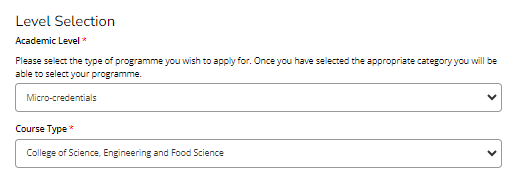| Code | NE6202 |
|---|---|
| Duration | 15 weeks |
| Teaching Mode | Part-Time. See Additional Teaching Mode Information for more info. |
| NFQ Level | Level 9 |
| Fees | €1,000 - HCI Subsidy initiative See Fees and Costs for full details. |
| Closing Date | Currently closed for applications |
| Venue | Blended delivery. |
| Credits | 5 |
| Start Date | TBC |
Outline
Are you passionate about sustainable energy and eager to make a positive impact? UCC offers a suite of postgraduate options for STEM graduates wishing to upskill or reskill - including some funded through the Human Capital Initiative (HCI).
Join us for a special information webinar on 26 June at 1pm to meet our staff and get all your questions answered. Don’t miss out on this incredible opportunity to shape a greener future!
Click here to join the webinar: https://forms.office.com/e/A4frynmS4d
Module Goal
-
The goal of this module is to teach students the concepts, practices and real-world experiences of energy technology innovation and energy sector innovation.
Module Content
- Energy technology innovation.
- Technology readiness levels.
- Research frontier for energy supply and demand technologies.
- Designing and solving research problems.
- Multi-criteria analysis and evaluation.
- Global & country RD&D trends.
- Analysis of patent databases.
- Energy system innovation.
- Innovation lifecycle indicators.
- Technology innovation system.
- Technology learning processes.
- Energy systems modelling of innovation.
- Diffusion of innovations.
- Science-push, market-pull, and policy-support innovation dynamics.
- Energy sector innovation.
- Start-ups and accelerator programs.
- Incumbent perspectives and testimonies.
- Decision-support tools.
- EN-Roads energy modelling software.
- Multi-disciplinary group problem-solving.
Additional Teaching Mode Information
- 30 x 1Hr(s) Lectures
- 2 x 2Hr(s) Tutorials
Practicalities
Continuous Assessment Details: 100 marks
-
Written examination (60 marks)
- Continuous Assessment (40 marks)
Why Choose
On successful completion of this module, students should be able to:
- Describe the key concepts, important trends, and current challenges in energy innovation.
- Describe the complex interrelationship between innovation in energy technology, energy systems and the energy sector and how this can influence approaches to problem-solving.
- Describe and discuss the research frontier of a wide range of energy technologies.
- Analyse and propose systematic approaches to findings solutions for the innovation challenges of energy technologies at different TRLs, scales, and stages (i.e. supply, demand).
- Compare and critically evaluate the multi-dimensional diffusion of innovation challenges for different energy technologies in different settings and environments.
- Design an energy technology innovation system to address particular innovation system challenges.
- Work in a multi-disciplinary setting and present findings of an evaluation of the impact of a long-term energy innovation strategy using the EN-Roads decision support tool.
Skills and Careers Information
Learning Pathway:
Students completing this Micro Credential gain 5 credits exemption from the PG Cert in Offshore Renewable Energy.
Read more about that programme here PG Cert Offshore Renewable Energy
Requirements
- A Second Class Honours Grade 2 (or equivalent) in a primary honours degree (NFQ Level 8) in any discipline
of Engineering OR - a Second Class Honours Grade 2 (or equivalent) in a primary honours degree (NFQ Level 8) in areas of science
that required having completed level 8 mathematical subjects deemed equivalent to those of engineering (e.g. Physics, Mathematical Sciences, some Computing Science degrees), pending assessment by Programme Director OR - a pass in any accredited level 8 Engineering degree followed by professional experience deemed of sufficient added value, pending assessment by the Programme Director.
A quota will be allocated to applicants who do not meet these entry requirements. These applicants will be considered under Recognition of Prior Learning and assessed on the following factors:
- Academic achievement
- Prior Work Experience
- Letter of Reference
- Personal Statement
Fees and Costs
The HCI Pillar 3 Micro-credential Learner Fee Subsidy has been introduced to enable more learners to address critical skills gaps and engage with lifelong learning.
The fee for this micro-credential is €1,000 but applicants who meet the subsidy requirements can attend this micro-credential for €200.
Check your eligibility on the HEA Website
How To Apply
Please select the following options during your online application (once you have created your profile)
Start a new Micro-credentials application by selecting as below

In the application level tab select the options below and then select the programme/module you'd like to apply for

